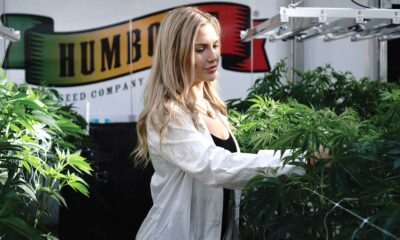
Legal
Legal Pot Crushes Mexican Cartel
Cannabis consumers in America are making the switch from Mexican sungrown weed for equally inexpensive quality indoor cannabis. It’s a classic case of fighting fire with fire — fighting the cannabis black market the only way possible — with a cheaper and better quality product.
The War on Drugs, of course, cannot be won with brute force. Illegal cannabis farmers in Mexico are coming to terms with the fact that they can no longer compete with indoor American cannabis.
At his peak, El Chapo and the Sinaloa cartel allegedly supplied up to two-thirds of the entire supply of marijuana that entered into the United States. The Golden Triangle is Mexico’s answer to the Emerald Triangle. Chihuahua, Durango and Sinaloa make up the Golden Triangle, where cartel activity is highest. The Sinaloa cartel is alive and well, but not for long. State prohibitionist policies are falling like dominoes. In desperation, Mexican growers have cut the wholesale price for Sinaloan marijuana by nearly three-quarters.
According to the DEA’s own 2015 National Drug Threat Assessment Summary, marijuana seizures on the border dropped 23.6 percent in total weight from 2013 to 2014. Coincidentally, Colorado, Oregon and Washington have all recently legalized recreational marijuana. “The reasons for this decline are not well defined and remain unclear; cartel intentions and the possible impact of domestic legalization initiatives are continuing intelligence gaps relative to the levels of Mexican marijuana entering the United States,” Marijuana.com‘s Al Olson told CNBC. “Mexico is getting hit because the black market is being inundated with marijuana from these legal states.”
Cartel activity, however, is nowhere near over. The DEA recently seized 900,000 kilograms of cannabis. It’s pretty difficult to calculate the actual amount of illegal marijuana that’s coming across the border. “We don’t have real data, just some anecdotes (so far),” said Jonathan Caulkins a professor of public policy at Carnegie Mellon University. “My sense is that there are a couple of offsetting effects and considerable uncertainty as of yet.”
The Sinaloa Cartel slashed prices for seeded outdoor by 70 percent since 2011. “It’s a big difference,” a Sinaloan farmer told NPR. “If the U.S. continues to legalize pot, they will run us into the ground.” Mexico now supplies only one-third of America’s marijuana, which is down from two-thirds in 2008. In the DEA’s own words “Mexican cartels are attempting to produce higher-quality marijuana to keep up with U.S. demand for high-quality marijuana.” It’s unclear how Sinaloan farmers will operate without the presence of Joaquín Guzmán Loera. The Sinaloa Cartel has become vertically integrated by desperately plunging into the methamphetamine market.
Sinaloa’s misfit counterpart, the Zetas cartel, is often described as the psychopathic, irrational twin Sinaloa. Both are violent. Both have caused thousands of Mexicans and journalists to die. The difference is the Zetas are more unpredictable and disorderly.
Criminal activity is down north of the border as well. According to a report at DrugPolicy.org, since legalization in Colorado, “marijuana possession charges (not including Denver) are down nearly 80 percent, marijuana cultivation charges also dropped nearly 80 percent, and marijuana distribution charges are down over 97 percent.” It’s difficult to determine just exactly what’s behind the drop in marijuana charges. It’s quite plausible that the police have simply stopped going after marijuana users. The New York Times reported that marijuana-related criminal activity dropped 65 percent in Colorado after legalization.
Since Colorado and Washington reportedly produce more cannabis than the amount that can be sold within their states, it’s apparent that they supply neighboring states. Legalizing cannabis makes the plant no different than any other agricultural product.
Keep marijuana safe. Buy local. Buy American.
Do you think legalization is having an impact on the black market? Tell us in the comments below.
























